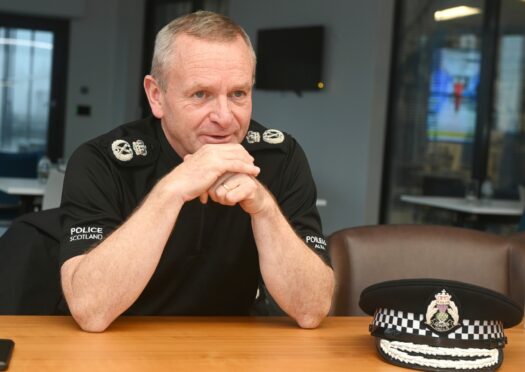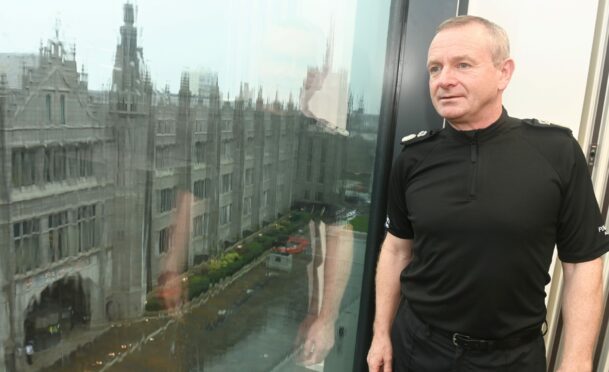Police Scotland’s most senior officer has cautioned the public about “romanticising the past” as he defended his organisation’s decision to close local police stations.
In a wide-ranging exclusive interview with the Press and Journal, Chief Constable Iain Livingstone said that while he understands the “iconic nature” of local stations to communities, he added it was important that the force adapts to the modern nature of crime, in particular the threat posed by cybercrime.
Mr Livingstone stated that he wants a police force capable of fighting crime not only on the high street by also in the “virtual streets”.
In recent months, Portlethen’s police office has been earmarked for closure and Queen Street Headquarters in Aberdeen were shuttered – moves that attracted criticism.
On the closure of police stations, Mr Livingstone said: “There’s a danger to romanticising the past with the police because there’s a lot of things that we need to move away from. We need to develop.
“Whether a police station is open 24 hours a day or not does not mean that there aren’t police officers in your community.
“What we have found, and it’s an absolute truth, is that the number of people coming into a police station was down to single figures.
“The vast majority of people now use mobile phones, telephones, email or internet contact.”
Describing some of Police Scotland estate as “almost pre-war”, Mr Livingstone said the organisation needed a service that is “fit for purpose now and more importantly for how people live”.
He said that modern life is “lived in a different way” than it was when local bobbies policed a community and everyone knew the name of their local officer.
“The importance of a police presence in a community will never go away and every community in Scotland has an accessible and identifiable police presence,” Mr Livingstone said.
“But if you’re looking at whether a police station is open or not, that’s not the way I would wish to convince my fellow citizens that’s best to keep them safe and secure.”
‘Virtual streets where people are coming to harm’
Mr Livingstone pointed to the rise in cases of cybercrime as an example of where greater police resources need to be focused.
Official figures show that there were 14,130 cybercrimes alone in 2020/21 – double the figure from the previous year.
He said the new Aberdeen-based cybercrime team was one example of investment that might not be visible to the public but would have a great impact on their lives.
Mr Livingstone said: “Cyberspace is metaphysical so the attacks could be coming from anywhere.
“Do we have the capability and the skills that I want us to have? No. But we need to be honest with the community that we police that we need to put investment into that area.
“You might not necessarily see physical people walking the streets – because the virtual streets are where people are coming to harm.”
Increasing the “cyber-capability” of officers is key, he said, because of the growing reliance on electronic evidence.
He said: “We as a police service need to develop our skills and that we have the right profile of workforce to deal with that.
“As we go forward we need to make sure that we build our capabilities because cybercrime can sound like it is something that is remote and esoteric, but it’s not.
“Cyber-capability means a capability to interrogate devices and look at exchanges of information in the cyberspace.
“There is not a victim of crime, a perpetrator of crime, or a witness to a crime who will not have a device that actually requires us at times to go and seek evidence from it.”
For all the latest court cases in Aberdeen, as well as the latest crime and breaking incidents, join our new Facebook group HERE.


